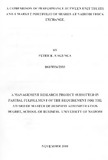A comparison of performance between unit trusts and a market portfolio of shares at Nairobi stock Exchange.
Abstract
There has been a dramatic increase in the number of individuals who want to invest in the
securities offered in the Nairobi stock exchange. The amount of funds however, required
tend to be prohibitively high to many. This is because investing in such securities
requires diversification in order to minimize the risk involved. This has seen the
emergence of unit investment trusts and mutual funds as one of the important vehicles of
investment.
The objective of the study was to investigate whether unit trusts in Kenya have better
performance compared to that of market portfolio, given their systematic risk. If unit
trusts have superior performance, then investment managers have superior share price
forecasting abilities and thus that active management (i.e., switching in and out of shares)
does influence performance.
The population of study consisted of all the Unit Trusts in Kenya. The Nairobi 20 share
index was used in estimating the performance of a market portfolio. Data on net asset
value and dividend paid by unit trusts was collected from offices of respective unit trusts
schemes. Data on estimate of dividend received on the market portfolio, and the 20 share
index was collected from the Nairobi Stock Exchange. Data on market interest rates,
interbank lending rates and free rates was collected from the Central Bank of Kenya. In
this study, the researcher used Jensen’s standard performance measure.
vii
Carrying out t-test statistic our null hypothesis was accepted since even though, unit trust
recorded a better performance than the stock market we could be able to see that the
results were not statistically significant given the low levels of significance for both one
tailed and two tailed tests. By carrying out regression tests, it was possible to confirm the
relationship between unit trust return and that of the market where it was found out that
the two have a strong relationship. Jensen index was carried out to confirm the returns of
the stock market by removing fluctuations that might distort the data used. Both the
Jensen alpha and adjusted alpha confirmed the positive returns from unit trust in the four
out of five years under study.
Sponsorhip
University of NairobiPublisher
School of Business

